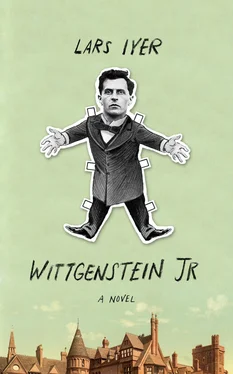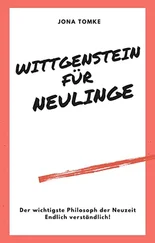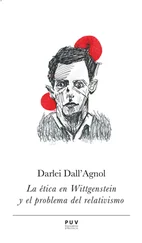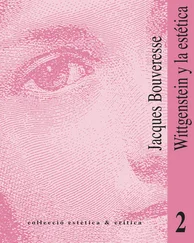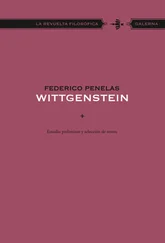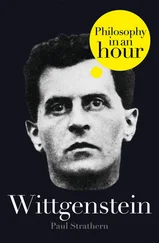It is and in such seeming all things are .
There must be no more fundamental work in logic, Wittgenstein says. Logic must not be put on a proper footing. It is not a question of helping logic to its feet .
Logic must be left to stumble , he says.
Logic must suffer a blow to the head , he says. We must strike off the head of logic. No: we must strike off our own heads, if we are to do logic.
A form of life : that’s what he’s looking for, he says. A context in which his life would make sense .
Simply to stand with your feet upon the earth. Just to open your eyes. Just to be here— here . To be of God. With God. And no longer asking, Why?
A rose has no why . Ordinary life has no why. Isn’t that what he’s in search of: ordinary life, where the things themselves are right in front of us?
Our problem is that we want him to say something complicated, Wittgenstein says. But all he’s concerned with is the obvious, the ordinary. All he’s interested in is showing us what we already know.
DOYLE: But if we already know it, why is it so hard to understand?
WITTGENSTEIN: Because something stands between us and what we know. Because the obvious has become difficult to access. The obvious is not obvious for us , that’s the trouble.
Friendly faces, Wittgenstein says, looking round the room at us. Faces to watch him as he tries to think. As he fails to think.
Once, love was the rule, and each one drew his neighbour upward , he quotes. Our faces, our very presence, draw him upward, he says. And perhaps, in his own way, he will draw us upward. Perhaps our presence will bring him the calm he needs, he says. Our presence, all of us around him, like a host of angels.
We are too young to hear him, he says. Too innocent . But he loves our youth, he says. He needs our innocence.
He must find our level, he says. He must put himself in our place, for his sake, if not for ours.
Pascal said that the true philosopher makes light of philosophy. He must try to learn from our lightness, Wittgenstein says. He must descend into our valleys.
Why is Chiron, the teacher of Achilles, presented as a centaur? Wittgenstein asks — because the student must feel that the teacher is at a distance. A distance created by the presence of thought.
The teacher must be higher than the student, he says. A pause. No, that’s not it. The teacher must bring the student into relationship with what is higher. Another pause. No, that is not it, either. And then: the teacher must suffer from his own lack of height, all the while consoling the student for his lack of height.
• • •
Socrates began thinking at whatever point his interlocutors were starting from. He accompanied them, travelled with them, until they came to their moment of crisis, when they were overwhelmed by discouragement and wanted to break off the discussion. And then — by what miracle? — Socrates would take his interlocutors’ doubt and discouragement upon himself. And then — another miracle! — Socrates would transfigure this doubt, and affirm this confusion, until doubt and confusion became the positive outcome of philosophy.
Aporia , that’s the word, Wittgenstein says, writing it on the blackboard. Literally — no passage, no way forward. There exists a point of arrival, but no path , he says, quoting. But perhaps there is no point of arrival, either.
A walk on the Backs.
We speak of the legendary night-climbs of Cambridge. Of St John’s College Main Gate (easy — Doyle has climbed it on a drunken night out, he says). Of the Wren Library (very pretty, Alexander Kirwin says — he’s climbed it twice). Of New Court Tower (he’s stood on its peak before dawn, Benedict Kirwin says). And we speak of the famous Senate House leap, with its deadly plunge (Mulberry wants to plunge, he says).
Wittgenstein smiles. He likes listening to our nonsense, he says. He glories in our inanity! In the poverty of our prattle! It is like a balm to him. It is possible to bathe in nonsense, he says. To be refreshed by it.
We are his assistants, he says. His helpers. No, that’s not it. For we do not really help him — we are more likely to get in his way. We are obstacles on his path. But we are necessary obstacles — obstacles placed there by God. Obstacles to remind him of lightness. Obstacles to show him that his way is too heavy — too arid, when it should be lightness itself; too dull, when it should flash and laugh and dazzle.
The path to thought lies also through laughter and forgetting: that is what we recall him to — that there must also be a giddiness of thought; that God Himself laughs; that God wants us to laugh … Christ’s Pieces, after class. On the benches, Wittgenstein among us.
Guthrie performing Doyle’s new show, based on the life of the real Wittgenstein.
Wittgenstein’s visit to Bertrand Russell’s Cambridge rooms (Guthrie expertly playing both men: Russell, languorous, relaxed, the English don, at ease in the world; Wittgenstein, frenetic, feverish, the Austrian intellectual, pacing the floor).
First song: ‘Am I an Idiot, Or Just a Philosopher?’ Sample lyric:
I knocked on Bertrand Russell’s door
Just before the First World War
I said, Tell me, Sir, am I a real philosopher
Or have you heard it all before?
Wittgenstein’s period as a soldier, hating his fellow soldiers, and possessed by the most terrible despairs (Guthrie’s face an expressive miracle), but filled, too, with a new mysticism, a new religiosity (Guthrie’s face luminous, God-touched) …
Second song: ‘Absolutely Safe.’ Rousing chorus:
And when the enemy machine guns strafe
God keeps me … absolutely safe!
Wittgenstein’s break with philosophy — his period in the Austrian countryside, teaching peasant children, inspiring peasant children, but being over-severe with lazy peasant children. Wittgenstein, boxing their ears, spanking their backsides (Guthrie masterfully playing both Wittgenstein-the-teacher and the lazy pupils) …
Third song: ‘No One Understands Me.’
When I box the children’s ears
It’s just in order to still my fears
That they will grow up fearful slobs
And they will not believe in God …
Wittgenstein’s architectural period, designing and managing the building of a house for his sister. His extreme rigour, his eye for the smallest detail. And the uninhabitable home he constructed in the Bauhaus style, all severity, all sharp corners. (Guthrie’s face an image of intensity, of focus, of exasperation … Guthrie playing both Wittgenstein-the-architect, and his put-upon project manager, bursting into tears with stress …)
Fourth song: ‘Sharp Angles.’
Don’t think I’m just acting
I’m not cruel, I’m just very exacting …
Wittgenstein’s return to Cambridge, not in triumph, but in humility. Philosophy, for him, now no longer a mapping of depth, but a topography of the surface (Guthrie, shoulders rounded, eyes to the floor).
Fifth song: ‘Ordinary Life.’
I’m in love with ordinary life
I’ll take the everyday as my wife
I prefer the chat of porter and bedmaker
To academic talk and the cocktail shaker …
How Wittgenstein works! How he writes! (Guthrie miming the philosopher sitting at his desk, copying his remarks into an enormous ledger.) Wittgenstein, taking solitary Cambridge-hating walks (Guthrie, stomping, scowling). Wittgenstein, estranged from his colleagues (Guthrie, wagging his fingers, looking vexed). Wittgenstein, full of apocalyptic thoughts about the end of the world (Guthrie, hand to brow, shaking his head) …
Читать дальше
